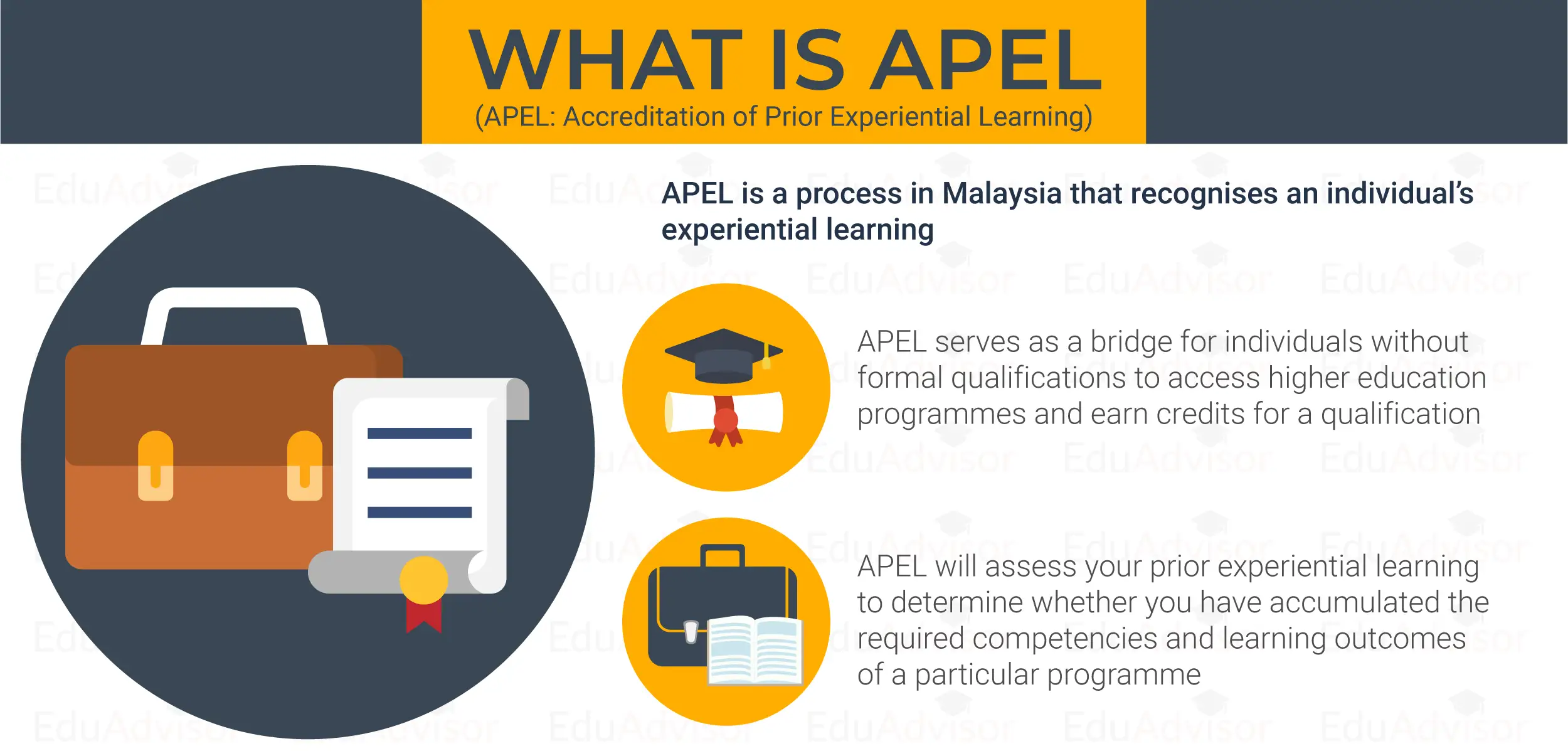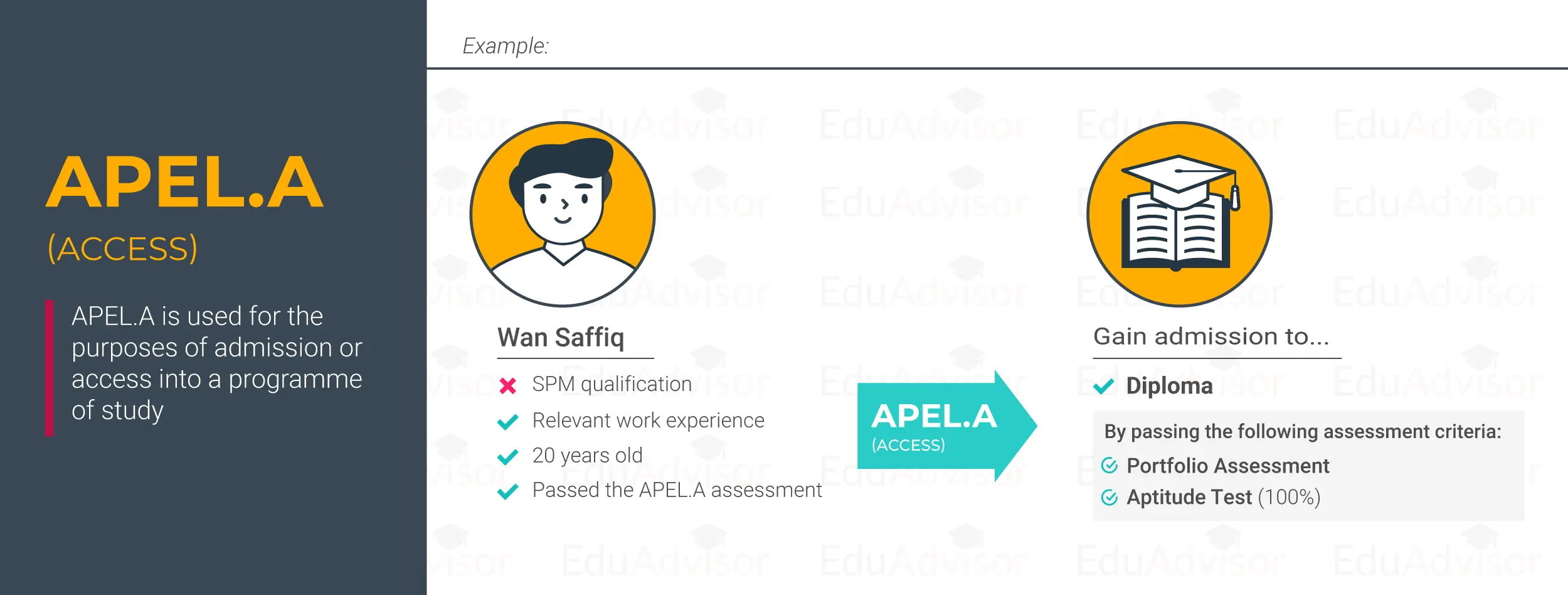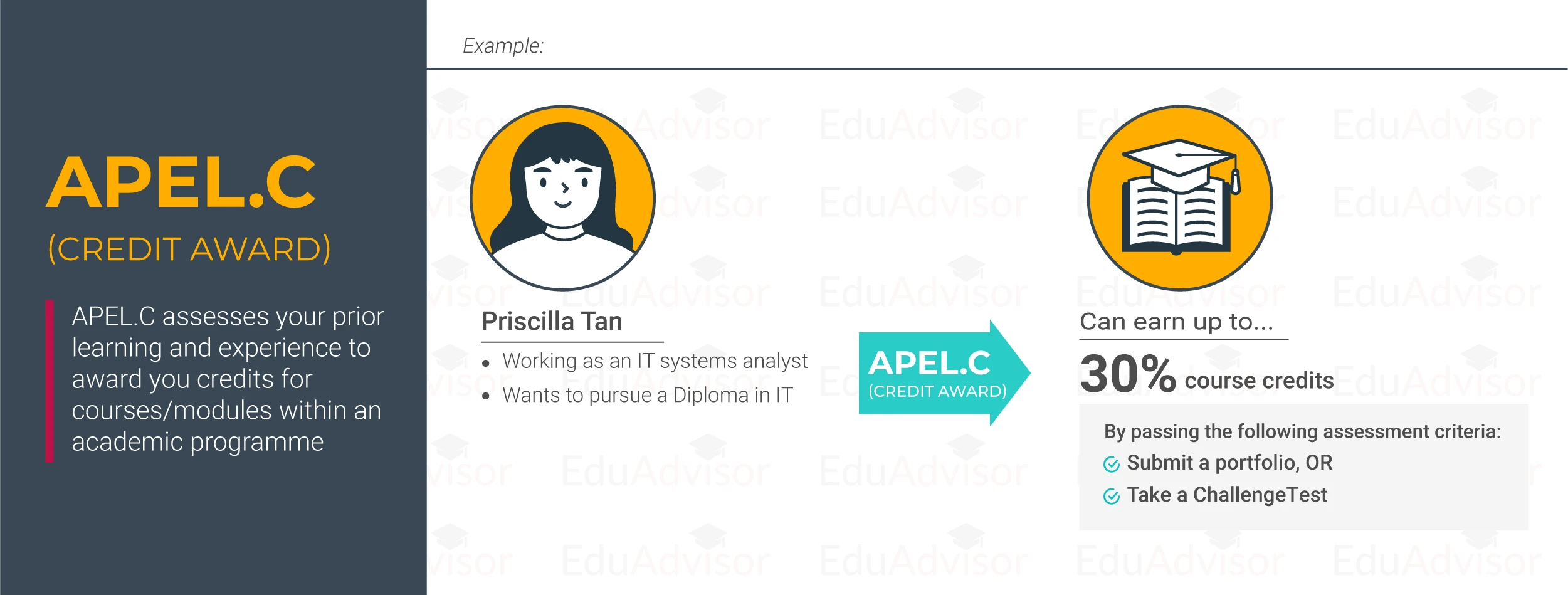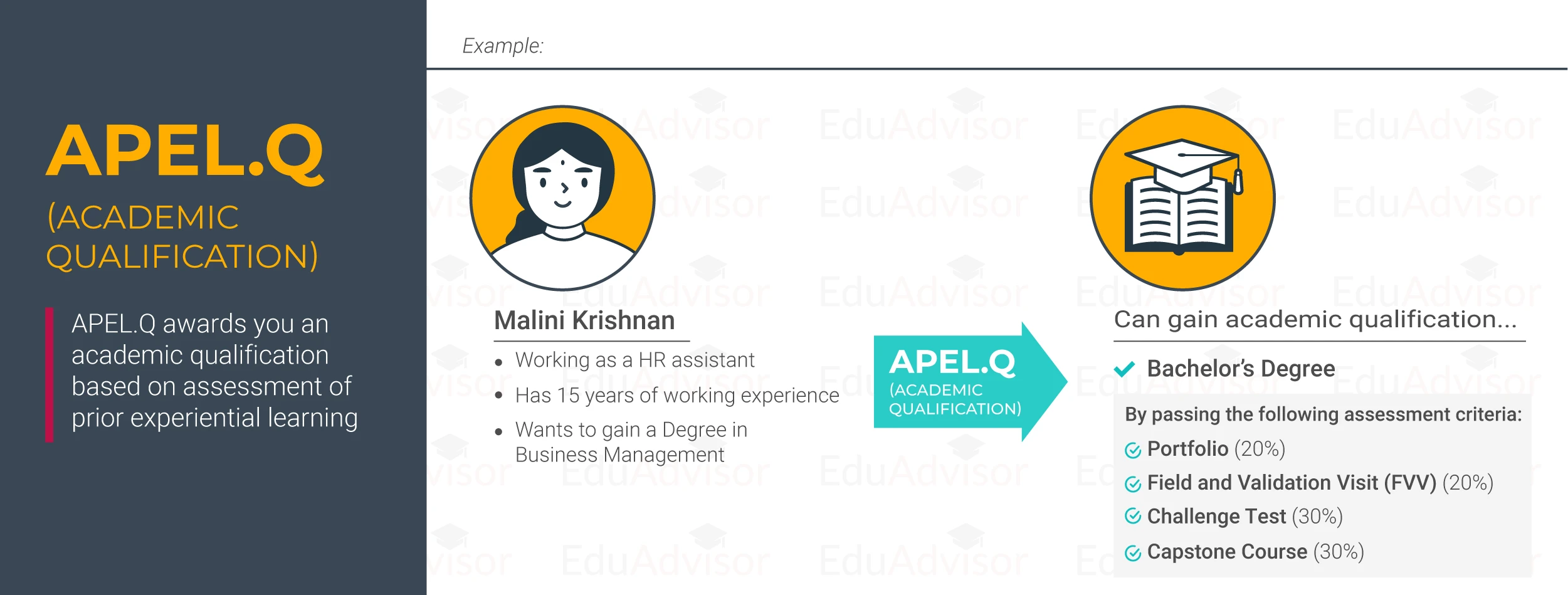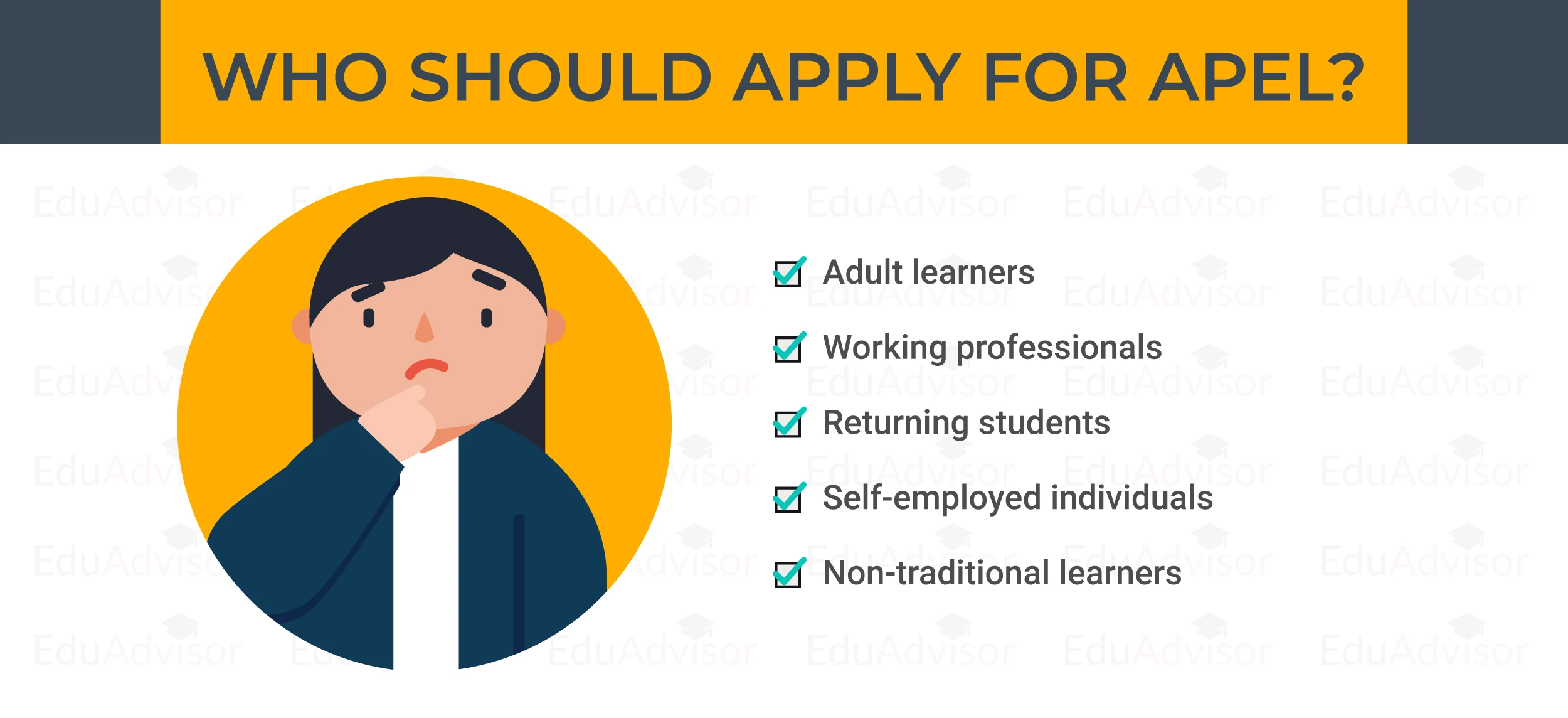The Complete Guide to APEL in Malaysia
If you’re a working professional looking to pursue higher education but do not have formal qualifications to meet entry requirements, APEL is your second chance.
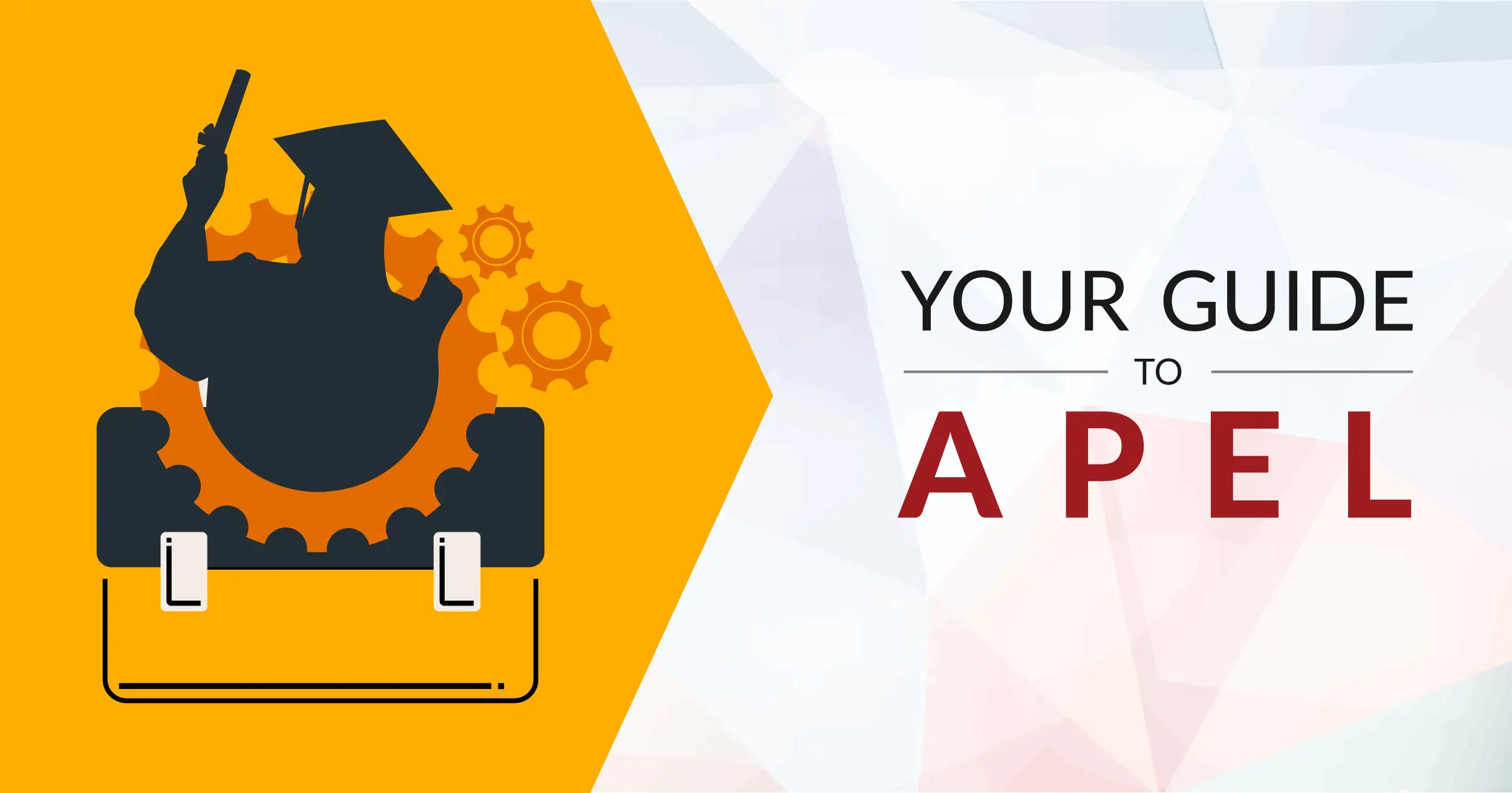
Are you looking to pursue higher education but do not have the right grades or qualifications to meet the university entry requirements? Do you also have some relevant work or life experience under your belt that you wish could be translated into academic recognition?
If so, then Accreditation of Prior Experiential Learning (APEL) is your second chance.
Whether it’s because you missed the mark in SPM, dropped out of college due to financial constraints or never felt the need to have a formal academic certificate until recently, it’s never too late, nor impossible, to pursue an academic qualification. The benefits are plenty — it can boost your career trajectory, improve your earning potential and enhance your personal development.
In this comprehensive guide, we will dive into the intricate landscape of APEL in Malaysia, exploring the APEL eligibility criteria, application process and assessment criteria. We will also discuss APEL courses and universities, as well as who can benefit from applying for APEL.
#1. What is APEL?
Accreditation of Prior Experience Learning (APEL) is a process in Malaysia that recognises an individual’s experiential learning, whether it’s from work experience, self-study or any life experiences that are equivalent to formal education.
The main objective of APEL is to allow those who might not have traditional academic qualifications to still access higher education based on their knowledge and experience. What this means is that even if you do not have the formal qualifications (e.g. SPM) for higher education (e.g. diploma, degree), APEL acts as a bridge for you to gain access to a programme of study (e.g. qualify for a diploma without an SPM certificate) or award of credits for a qualification (i.e. exempted from completing certain modules in a programme).
But how does APEL work?
Well, the APEL process involves assessing your prior experiential learning to determine whether you have accumulated the required competencies and learning outcomes of a particular programme. As part of the process, you will need to submit evidence of prior learning, be it from formal education (intentional learning delivered in structured environments such as schools), non-formal education (learning that takes place in mainstream education systems that do not lead to a formal certification) or informal education (learning that takes place through work and life experiences).
#2. Types of APEL in Malaysia
Overall, there are 3 types of APEL processes in Malaysia — APEL.A (Access), APEL.C (Credit Award) and APEL.Q (Academic Qualifications). Which APEL you choose depends on your specific goals and situation.
| Type of APEL | Description |
|---|---|
| APEL.A (Access) | To gain admission or access into a programme of study if you lack the academic qualifications |
| APEL.C (Credit Award) | To gain credits for courses/modules in an academic programme due to experiential learning |
| APEL.Q (Academic Qualification) | To gain an academic qualification based on assessment of prior experiential learning |
Each APEL has different requirements, application process and assessment instruments.
To learn more about the requirements for each type of APEL, how you can apply and what the assessment criteria are, read on.

#3. APEL.A (Access)
a) What is APEL.A (Access)?
APEL.A is used for the purposes of admission or access into a programme of study. APEL.A provides an opportunity for those who have work experience but lack the academic qualifications to continue their studies.
For example, if you do not have an SPM qualification but would like to pursue a diploma or degree, this will be possible via APEL.A through assessment of your formal education and past work and learning experiences.
APEL.A grants you access to 10 levels of qualifications — Certificate, Diploma, Advanced Diploma, Graduate Certificate, Graduate Diploma, Bachelor’s Degree, Postgraduate Certificate, Postgraduate Diploma, Master’s Degree and Doctoral Degree (PhD).
b) What are the requirements for APEL.A?
You can apply for APEL.A if you meet the following criteria:
- Possess relevant work experience
- Meet the age requirements:
- Certificate: 19 years old and above
- Advanced Diploma and Diploma: 20 years old and above
- Bachelor’s Degree, Graduate Diploma and Graduate Certificate: 21 years old and above
- Master’s Degree, Postgraduate Diploma and Postgraduate Certificate: 30 years old and above
- Doctoral Degree: 35 years and above
- Meet the formal education requirements:
- Certificate, Diploma and Bachelor’s Degree: None required
- Master’s Degree: At least STPM/Diploma or equivalent
- Doctoral Degree: At least Bachelor’s Degree or equivalent
- Pass the APEL.A assessment
c) How to apply for APEL.A?
There are 2 ways of applying for an APEL.A assessment. You can either submit your application online directly to MQA or get assessed at an APEL Assessment Centre (i.e. Pusat Penilaian APEL (PPA)). Regardless of which method or assessment centre you choose, it is important to note that the assessment of APEL.A is standardised nationwide.
i) Applying for APEL.A assessment with MQA
Here are the steps to apply for APEL.A via MQA:
- Head over to MQA’s APEL portal here.
- Complete the application form accordingly. As part of the process, you will need to select an assessment centre. Take note that some centres (known as PPA Dalaman) allow you to pursue studies at their institution only. These centres are clearly indicated on the form.
- You will receive an email with further instructions on how to complete the full application process at your selected assessment centre.
- You will need to pay an assessment fee, where the amount will depend on the level of qualification that you’re applying for.
- Thereafter, you will need to complete an aptitude test and submit a portfolio. For Master’s candidates, you’ll also need to attend an interview.
ii) Applying for APEL.A assessment directly with a Pusat Penilaian APEL
You also have the option to apply directly to an APEL assessment centre. The process will be similar to how you would apply through MQA’s APEL portal.
- Select an institution (PPA Dalaman) and head over to the institution’s APEL portal.
- Submit your application accordingly.
- You will need to pay an assessment fee, where the amount differs depending on the qualification level.
- You will need to complete an aptitude test and submit a portfolio. For Master’s candidates, an interview will be required.
The key differences between applying via MQA and directly with an institution are:
- By applying directly, you will only be assessed for programmes that are available at your chosen assessment centre. As a result, you can only pursue your studies at the selected institution.
- By applying directly, the assessment fees are often waived or rebated by the institutions if you choose to continue your studies with them.
iii) Assessment fee for APEL.A
How much it costs to apply for APEL.A depends on the level of qualification you’re applying for.
| Level | Fee |
|---|---|
| Certificate | RM240 |
| Diploma | RM240 |
| Advanced Diploma | RM240 |
| Bachelor’s Degree | RM370 |
| Master’s Degree (Mixed Mode and Coursework) | RM560 |
| Master’s Degree (Research) | RM560 |
| Doctoral Degree | RM750 |
d) How are you assessed for APEL.A?
For Certificate, Diploma and Advance Diploma levels, you will be assessed via the following criteria:
- Aptitude Test (100%): Covers numeracy, English and Bahasa Malaysia literacy, and general knowledge / critical thinking.
- Portfolio Assessment: Applicants at these levels are required to submit a portfolio as proof of prior experiential learning. However, the portfolio will not be included in the assessment.
For Graduate Certificate, Graduate Diploma and Bachelor’s Degree levels, you will be assessed via the following criteria:
- Aptitude Test (30%): Covers numeracy, English and Bahasa Malaysia literacy, and general knowledge / critical thinking.
- Portfolio Assessment (70%): Evidence of prior learning including certificates, documents and awards, workplace endorsements and testimonials, and work samples that have direct relevance to the learning acquired.
For Postgraduate Certificate, Postgraduate Diploma and Master’s Degree, the assessment criteria depends on whether your programme is a coursework or mixed mode programme or a fully research-based programme.
For coursework and mixed mode programmes, you will be assessed via the following criteria:
- Aptitude Test (40%): Covers numeracy, English and Bahasa Malaysia literacy, and general knowledge / critical thinking.
- Portfolio Assessment (40%): Evidence of prior learning including certificates, documents and awards, workplace endorsements and testimonials, and work samples that have direct relevance to the learning acquired.
- Interview Assessment (20%): Presentation of your portfolio to a panel of assessors to explain the acquired learning in greater detail.
For fully research-based programmes, the assessment criteria are as follows:
- Portfolio Assessment (50%): Evidence of prior learning including certificates, documents and awards, workplace endorsements and testimonials, and work samples that have direct relevance to the learning acquired.
- Interview Assessment (20%): Presentation of your portfolio to a panel of assessors to explain the acquired learning in greater detail.
- Research Intent and Presentation (30%): To evaluate the applicant’s readiness and preparedness for the programme. You will be required to submit a brief research intent and if relevant, demonstrate the necessary skills required by the specific programme.
For entry into a Doctorate level programme, you will be assessed through:
- Portfolio Assessment (50%): Evidence of prior learning including certificates, documents and awards, workplace endorsements and testimonials, and work samples that have direct relevance to the learning acquired.
- Research Intent and Presentation (30%): To evaluate the applicant's readiness and preparedness for the programme. You will be required to submit a brief research intent and if relevant, demonstrate the necessary skills required by the specific programme.
- Interview Assessment (20%): To assess the applicant’s skills and knowledge. This will take place upon a successful completion of the Research Intent and Presentation assessment.
e) What is the outcome of APEL.A?
You will be notified either by MQA or the PPA on whether or not you have passed the APEL.A assessment. If you are successful, you will be awarded an APEL certification which you can use to apply to enter any higher education institution in Malaysia.
If you failed your Aptitude Test, you may appeal the results or apply for a resit. Do note you are only allowed to resit for the Aptitude Test for a maximum of 2 attempts. Should you fail after your second attempt, you must wait a minimum of 3 months before resitting for the third time.
However, if you missed the mark on your portfolio, you can only resubmit your portfolio 6 months later.
#4. APEL.C (Credit Award)
a) What is APEL.C (Credit Award)?
APEL.C, on the other hand, assesses your prior learning and experience to award you credits for courses/modules within an academic programme. The objective of APEL.C is to recognise and grant you credits for the learning that you’ve gained (e.g. work experience, short courses), allowing you to complete a programme of study in a shorter period of time.
For instance, if you are currently working as an IT systems analyst and would like to pursue a Diploma in IT, you can submit an application for APEL.C providing evidence that your work experience matches the learning outcomes in a Diploma in IT. If approved, you can earn up to 30% of your course credits, shortening your study duration.
Credits can be awarded for all levels of education including Certificate, Diploma, Bachelor’s Degree and even Master’s and Doctoral Degree (for coursework and mixed-mode programmes only).
b) What are the requirements for APEL.C?
APEL.C allows you to gain credit for courses in a programme of study if you can demonstrate prior experiential learning. There are no specific requirements for APEL.C.
- Anyone with relevant experience is eligible to apply for APEL.C, as long as they can demonstrate achievement of at least 50% of the course learning outcome
c) How to apply for APEL.C?
To apply for credit under APEL.C, you will need to submit your application directly to your higher education provider. The process is as follows:
- Get in touch with your institution’s APEL centre, where you will be assigned to an Advisor.
- Undertake a self-assessment exercise. Based on this, your Advisor will determine your eligibility and recommend whether to proceed with your APEL.C assessment or not.
- If you are recommended by your Advisor to proceed, you will need to complete the APEL.C application form and pay an assessment fee (as determined by the institution).
- Depending on the nature of your course, you can opt to take either a Challenge Test or submit a Portfolio.
- If you are able to demonstrate an achievement of at least 50% of each course learning outcome, your results will be sent to the institution’s Academic Board / Senate for endorsement.
- Upon endorsement, you will be awarded with course credits accordingly.
d) How are you assessed for APEL.C?
Depending on the nature of your course, you will either take a Challenge Test or submit a portfolio, as guided by your Advisor.
The Challenge Test is aimed to assess if you have achieved the course learning outcomes. It can be in the form of a written test (e.g. multiple choice, short answer, essay, etc.), oral exam (e.g. structured oral exam, one-to-one interview, panel interview) and/or performance assessment (e.g. simulation, presentation, skills demonstration).
A portfolio submission, on the other hand, consists of evidence to demonstrate that you have acquired knowledge that is relevant and specific to the course learning outcomes.
e) What is the outcome of APEL.C?
If you manage to show that you have achieved at least 50% of the course learning outcomes, you will then be awarded course credits, which will be reflected in your academic transcript. Note that the grades will not be used in the calculation of your CGPA; however, these credits will contribute towards the total credit requirement for graduation.
If you are unsuccessful, you may appeal your results. However, you are not allowed to reattempt the Challenge Test or submit new evidence for your portfolio.

#5. APEL.Q (Academic Qualification)
a) What is APEL.Q (Academic Qualification)?
Aside from granting you access to a qualification or awarding you credits, APEL also has a process called APEL.Q which awards you an academic qualification based on assessment of prior experiential learning.
What this means is that those who have extensive experience can use that to gain credits for the entire programme of study. You will only need to complete a capstone course which may consist of a suite of higher-level courses, a final-year project, or a thesis or dissertation. As such, someone with 10 years of working experience, for example, may be awarded a diploma qualification through APEL.Q if they pass all the assessments and a capstone course.
APEL.Q can be gained for 6 levels of qualifications — Certificate, Diploma, Advanced Diploma, Bachelor’s Degree, Master’s Degree and Doctoral Degree (PhD).
b) What are the requirements for APEL.Q?
Through APEL.Q, you can earn a degree (or other academic qualifications) without having formal qualifications. The requirements are:
- Meet minimum years of working experience in the relevant field:
- Certificate: 5 years
- Diploma: 10 years
- Advanced Diploma: 12 years
- Bachelor’s Degree: 15 years
- Master’s Degree: 20 years
- Doctoral Degree: 25 years
- No other requirements apply
c) How to apply for APEL.Q?
All applications for APEL.Q are centrally monitored by MQA. To apply for APEL.Q:
- Submit your application via MQA’s APEL.Q portal.
- As part of the application, you will need to select your desired institution and programme.
- You will be appointed an Advisor from your selected institution who will guide you through the process.
- You will then take a Guided Self-Assessment exercise.
- Your Advisor will then determine your eligibility. If you are recommended by your Advisor to proceed, you will need to complete the application form and pay an assessment fee (as determined by the institution).
- Thereafter, you will proceed with the assessment stage that includes the submission of your Portfolio, a Field and Validation Visit (FVV), a Challenge Test and a Capstone Course.
Before applying for APEL.Q, it is recommended that you get in touch with the institution first to have a good understanding of the process.
d) How are you assessed for APEL.Q?
The assessment for APEL.Q consists of the following:
- Portfolio (20%): Evidence of prior experiential learning organised by programme learning outcomes.
- Field and Validation Visit (FVV) (20%): Held at the workplace where you will demonstrate that your learning in a particular job corresponds to the programme learning outcomes.
- Challenge Test (30%): Can be in the form of a written test (e.g. multiple choice, short answer, essay, etc.), oral exam (e.g. structured oral exam, one-to-one interview, panel interview) and/or performance assessment (e.g. simulation, presentation, skills demonstration).
Once you have successfully completed all the assessment stages above, you will embark on a Capstone Course that is often offered by universities in the final year of studies. Depending on the programme, it could be a suite of higher-level courses, a final-year project, or a thesis or dissertation. This portion contributes to 30% of your final assessment and you will be evaluated via a comprehensive oral examination.
e) What is the outcome of APEL.Q?
To be awarded an academic qualification through APEL.Q, you must achieve at least 50% on each programme learning outcome tested across all assessment instruments — i.e. portfolio, Field and Validation Visit, Challenge Test and Capstone Course.
Should you fail any of the assessment stages, you will be given 3 attempts to pass. The best grade achieved throughout the resit process will be used in the calculation of your final CGPA.
#6. What Are the Benefits of APEL?
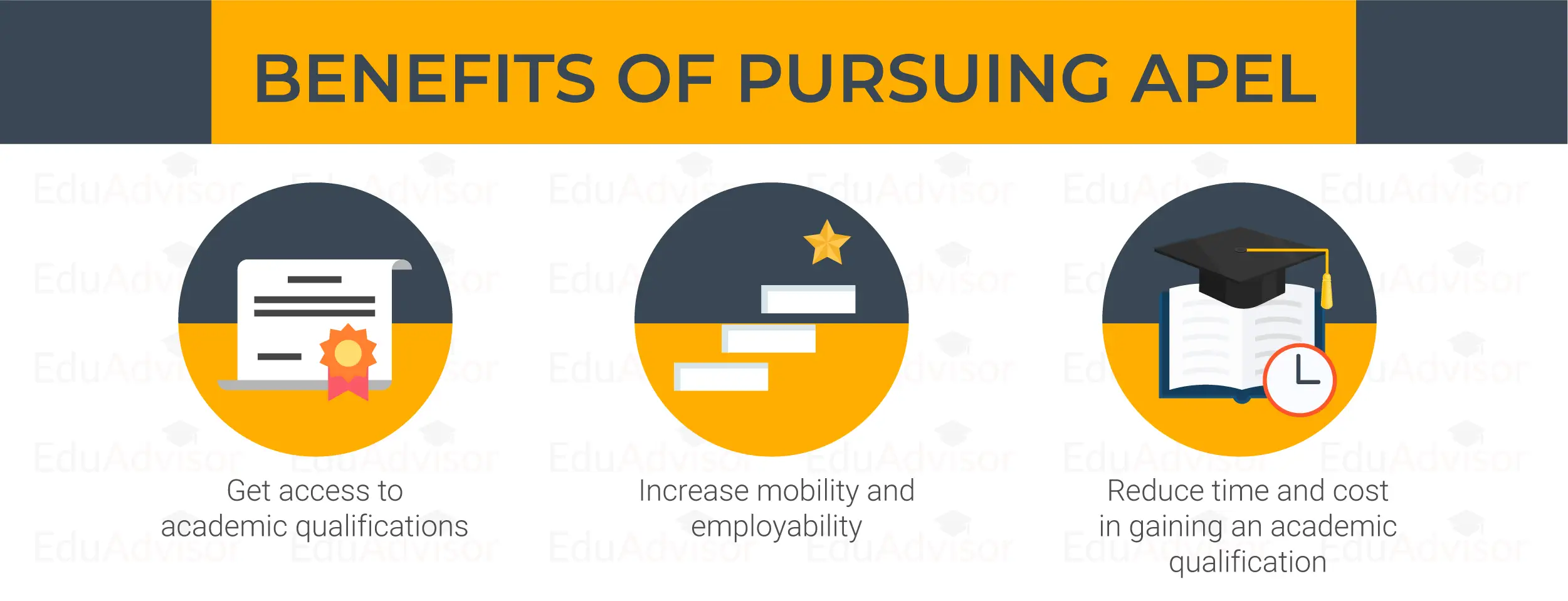
The recognition of experiential learning, whether it’s from work experience, self-study or life experience, can be hugely beneficial.
(a) Get access to academic qualifications
If you find yourself without the required grades or formal qualifications to enrol in an academic programme, yet possess substantial experience gained outside of traditional educational settings, APEL offers you the opportunity to pursue academic qualifications that would otherwise be inaccessible to you.
(b) Increase mobility and employability
APEL provides a pathway for you to acquire relevant qualifications, making you more competitive and desirable in the job market. These credentials can be valuable additions to your resume, expanding your career opportunities.
(c) Reduce time and cost in gaining an academic qualification
APEL allows you to receive credits for prior experiential learning. This expedites your academic journey as you won’t need to enrol in as many courses to fulfil degree requirements, saving you both time and money.
#7. Who Should Apply for APEL?
a) Who is APEL for?
Here are some of the most common groups of people who should consider applying for APEL:
- Adult learners who have substantial work experience or other non-formal learning experience and are looking to earn academic qualifications
- Working professionals seeking career advancement or qualify for promotions but lack specific academic credentials
- Returning students who have taken a break from formal education and are looking to re-enter the academic world
- Self-employed individuals looking to gain credentials for the knowledge and skills that they have gained
- Non-traditional learners who have acquired knowledge through online courses, workshops and self-study
b) What should you consider before applying for APEL?
- Do you meet the age criteria and the specific requirements (if any)?
- Is your work experience, skills, knowledge and past certifications relevant to the programme of your choice?
- Do you have sufficient evidence and documentation to support your experiential learning?
- As a mature learner, are you able to commit to studying again?
- Do you have to leave your current job for this? And if so, can you afford it?
- Does this meet your overall educational and professional objectives?
#8. Which Universities Accept APEL?
If you are looking to gain admission into a university programme via APEL.A, most (if not all) universities in Malaysia will accept your APEL.A certification in lieu of a formal academic qualification. However, this may not apply to some programmes, especially those that are governed by professional bodies.
For APEL.C, where you will gain course credits for prior experiential learning, only selected universities have been approved by MQA. The same goes for APEL.Q, where MQA has an approved list of universities and programmes.
#9. APEL Courses and Universities in Malaysia
Many universities in Malaysia accept APEL.A certification for enrolment into an academic programme. These programmes cover a wide range of disciplines including business and accounting, science and technology, education and humanities, as well as social sciences.
Furthermore, there are a number of universities that specialise in flexible learning options for the convenience of adult learners and working professionals. These institutions offer programmes that can be taken online and/or during weeknights and weekends, allowing you to balance both professional and academic commitments effectively.
